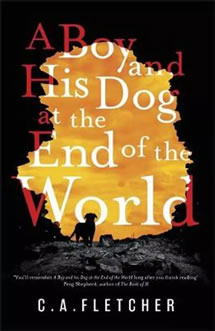Reviewed by Robert Goodman.
By CA Fletcher, Orbit, $32.99.
 The publishing world seems to be awash at the moment with post-apocalyptic tales. Stories of lone survivors making there way across empty, previously inhabited landscapes. Some of these use these common tropes and scenarios to say something about the world in which we live. In last year’s Severance by Ling Ma it was, among other things, consumerism. Also released in 2018, The Feed considered our reliance technology and in 2014’s Station Eleven by Emily St John Mandel it was the power of the arts. A Boy and His Dog at the End of the World has little of this. Rather, until a couple of twists at the end, it simply delivers on the promise of the title.
The publishing world seems to be awash at the moment with post-apocalyptic tales. Stories of lone survivors making there way across empty, previously inhabited landscapes. Some of these use these common tropes and scenarios to say something about the world in which we live. In last year’s Severance by Ling Ma it was, among other things, consumerism. Also released in 2018, The Feed considered our reliance technology and in 2014’s Station Eleven by Emily St John Mandel it was the power of the arts. A Boy and His Dog at the End of the World has little of this. Rather, until a couple of twists at the end, it simply delivers on the promise of the title.
This is the end days. For some reason, with only a few exceptions, humankind stopped being able to breed and the world has emptied out. Griz is part of a small family unit living a hand-to-mouth existence on an island off the coast of Scotland. Brand, a stranger, arrives looking to trade but tricks the family and flees with Jess, one of Griz’s two dogs. Not considering the consequences, eleven-year-old Griz jumps into a boat with his other dog, Jip, and chases after leading to a battle for survival and an odyssey on the mainland.
If anything, the driving force of this novel, again intimated by the title and stated on the first page by Griz is very simple:
… And there may be no law left except what you make it, but if you steal my dog, you can at least expect me to come after you. If we’re not loyal to the things we love, what’s the point? That’slike not having a memory. That’s when we stop being human.
It’s a fairly simple philosophy –loyalty and honour. But it is one that drives Griz to push beyond familiar boundaries and into the unknown.
The English landscape devoid of people and overgrown is one that will be overly familiar to those who read even a smattering of post-apocalyptic fiction:
Many of the houses we passed were roofless shells, overgrown with brambles or cracked apart by the vegetation that had taken root in them decades earlier… Stone built houses seems to stand up better than brick, and brick better that houses of wood covered in plaster. The walls of these houses had burst with damp long ago and here and there the remnants of plastic sheeting they had been lined with fluttered like white flags.
There is a bit of meta-commentary here. Griz is a voracious reader who particularly likes post-apocalyptic tales. That is those that imagine the world as it could have been rather than how it is currently. Plenty of classics get name-checked – Cormac McCarthyy’s The Road, Walter Miller’s A Canticle for Leibowitz, John Wyndham’s Day of the Triffids – while others are paid homage to in various ways. Given the obvious quest elements of the journey, even The Hobbit gets a mention. But all of these references serve to highlight the fairly derivative nature of this tale. Fictionally we have been here before, and the fact that the main character of this tale knows it makes it difficult to suspend the necessary disbelief to make the story work.
The story finally takes flight in the last fifty pages. But despite some major revelations about Griz’s world and some heavy emotional beats, the payoff is not worth the journey and in some ways is due to a bit of cheat. For those who enjoy a survivalist wander through a post-apocalyptic English landscape (and particularly dog lovers) A Boy and His Dog at the End of the World will probably scratch an itch. For everyone else, there are more interesting and resonant fictional post-apocalyptic journeys out there.
This and 300 more reviews can be found at Pile By the Bed.










